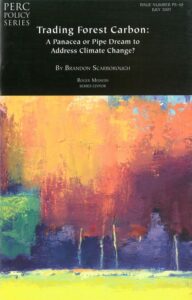DOWNLOAD THE FULL REPORT
Irrespective of the uncertainties surrounding the causes of climate change, the United States is poised to join the rest of the developed world in a fight against rising carbon dioxide levels.
Recently introduced legislation is proposing national limits on greenhouse gas emissions—CO2 in particular—while adopting provisions that would give affected companies some flexibility in how emission reduction goals are met. One employable strategy is to grow trees, which naturally remove CO2 from the air during photosynthesis; in essence, offsetting emissions from power plants, industrial facilities, and even cars. Carbon stored—sequestered—in trees would generate tradable credits which affected parties could buy and sell to help meet their respective emission reduction targets.
In “Trading Forest Carbon: A Panacea or Pipe Dream to Address Climate Change” PERC research fellow Brandon Scarborough takes a detailed look at the efficacy of employing forests and markets for sequestered carbon in the United States to address rising CO2 levels. This publication provides a thorough explanation of the forest carbon cycle and the mechanics of emission markets, while exposing many of the often overlooked pitfalls of commodifying forest carbon.
Download the full report, including endnotes and references.




